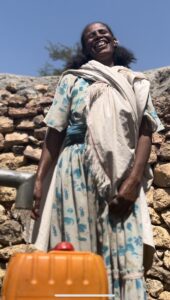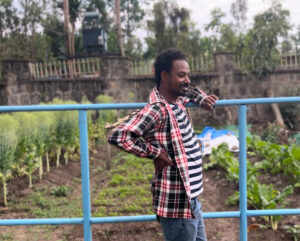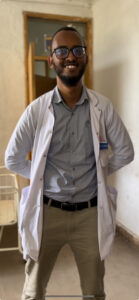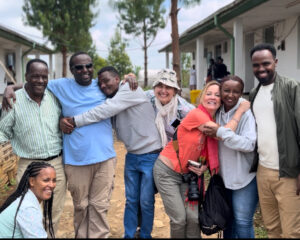Water to Thrive builds wells in East Africa, but that’s not all.
Through generous grant funding, Water to Thrive is able to expand its reach and provide clean water through various projects related to Post-war well repairs and made vast improvements within the healthcare facilities of rural maternal clinics.
We have been working diligently to repair the post–war damaged wells in Tigray and return the people to clean water here during a time of drastic need. Since our start on these projects, the people here have completely transformed their lives for the better. They are able to spend more time cultivating their crops and so food supply has increased within a region that was on the brink of famine just a couple of years ago.
Children are able to attend school once more and peace as well as quality of life have improved.

Ametetsioin happily collecting water from her newly repaired well explains how peace and prosperity have improved with the clean water access.
“We were previously digging sand ditches in order to collect water. There was no time to do anything else. This took a lot of our time away from grazing our animals and farming our lands. We suffered a lot because of this. Now we have peace once more and we are so grateful.” -Ametetsion
In addition to the post-conflict well repair work in Tigray, we are also helping the maternal health sector of extremely impoverished regions of Ethiopia.
Through generous grant funding, we have been able to fully renovate 34 clinics with safe, clean running water! These facilities previously had no water access and the negative impacts were clear on our previous visits. Sanitation and hygiene of the facilities was deplorable and with good reason.
Clean water access is critical to sanitation and hygiene efforts and greatly reduces infant mortality, sepsis, and promotes a more sterile environment. This has resulted in a happier and healthier post-op mother.
We have returned to Hawassa to meet with our partners, SECS, and conduct a presentation meeting with the clinic directors of the beneficiary clinics to ensure their cooperation with our process requirements.

Kurse Tufa, one of the top-performing clinic directors, explained how water access to their facility has enabled them to grow gardens and address the malnourishment issues plaguing the community. They even host cooking classes, educate the community on nutrition, and supply vegetables to them.
Project sustainability is at the forefront of our business model and principles. We are here to ensure these rural communities thrive for many years to come.
After the meeting we took a long drive through the lush mountain landscape to conduct a spot check on one of the beneficiary clinics which has been with running water for over a year now, thanks to the efforts of this project.
We are excited to report that the clinic is performing above standards and the positive impact on the community is proof they are going above and beyond to ensure sustainable change.
The clinic has been charting several health conditions, diseases, and symptoms, such as sepsis and diarrhea. They joyfully reported a large increase in healthy recovering mothers (post-op), decrease in infant mortality rates, sepsis, and a 30% decrease in diarrhea related illnesses.
The clinic is now able to maintain a more sterile environment and properly care for recovering infants and mothers.
“Infection prevention and control have increased for the healthcare workers and patients. Sanitation and hygiene have increased amongst the community, with decreases in sepsis and infant mortality. There has been roughly a 40-60% improvement in infant mortality for mothers and infants due to reduced sepsis with clean water access. There has also been a large reduction in infectious diseases.
– Silesh
Clinic Director
Hawelalida Clinic

Silesh was clearly very excited about all the positive changes that have been made possible through the diligent work of these projects.
“The health of the mothers has greatly improved; this, of course, is directly related to the increase in infant survival rates.”- Beza (SECS WASH Coordinator)
Building a community cooperative to improve the economic structure and health of developing countries involves many layers. Clean water access is clearly the foundation from which all opportunities for change and hope spring.
Clearly, positive change is happening within these regions. With clean water impacting all aspects of life, adequate access is directly related to the success or detriment of the people struggling to survive in these rural areas.
With a strong focus on sustainability processes, these regions will experience a life with less suffering and increased joy!
With clean water access, community health will continue to improve, future generations will gain more access to education, and the generational poverty burdens will lighten!

Jamie Morris
Marketing Director
Water to Thrive